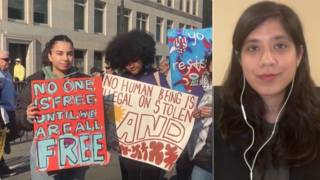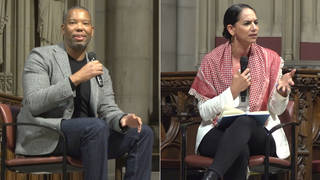
Related
A judge in California has dismissed a seven-year $100 million lawsuit against Greenpeace USA that threatened the group’s existence. Canadian logging giant Resolute Forest Products sued Greenpeace in the United States and Canada for defamation after the group exposed the company’s irresponsible practices, part of a pattern of corporations attempting to use the burdens of the legal process to intimidate, exhaust and censor activists. Known as SLAPP (Strategic Lawsuits Against Public Participation) lawsuits, they are increasingly being used by the rich and powerful to silence critics. We are joined by Deepa Padmanabha, deputy general counsel for Greenpeace USA, to discuss the organization’s legal victory, as well as the continued work of advocates to pass anti-SLAPP legislation and promote free speech. “We took on this fight not just for Greenpeace, but for everyone who dares speak truth to power, and we knew we had to win this both in the courtroom and for the movement,” says Padmanabha.
Transcript
AMY GOODMAN: This is Democracy Now!, democracynow.org. I’m Amy Goodman, with Nermeen Shaikh.
We end today’s show looking at a major legal victory for Greenpeace and free speech. The giant Canadian logging company Resolute Forest Products had sued Greenpeace in the United States and Canada after the group exposed the company’s irresponsible practices. A California judge recently dismissed a seven-year $100 million lawsuit against Greenpeace USA that threatened the group’s existence.
The logging company had filed a SLAPP suit against Greenpeace. ”SLAPP,” S-L-A-P-P, stands for Strategic Lawsuits Against Public Participation. Corporations have been increasingly filing SLAPP lawsuits against activists in an attempt to silence critics. Last year, the group EarthRights International released a report documenting how fossil fuel companies have filed 93 SLAPP lawsuits over the past decade.
For more, we’re joined by Deepa Padmanabha, deputy general counsel for Greenpeace USA.
We don’t have that much time, Deepa, but if you can lay out for us what this SLAPP suit has meant and what this victory is all about?
DEEPA PADMANABHA: Good morning, Amy. It’s great to be here, and it’s really great to be here in this moment to talk about a victory, a victory not only for Greenpeace, but for the movement.
And what this lawsuit attempted to do was to silence our advocacy work and send a chilling effect to all advocacy organizations, activists and anyone who dares speak truth to power, that corporations will engage in these abusive legal tactics in an attempt to silence us, to shut us down. And what I think is particularly important for viewers and listeners to know is that it means we’re doing something right. These are desperate attempts to silence the work we’re doing, because the movement we’re doing on the ground, the work that we’re doing to draw attention to abusive corporate behavior that threatens our planet and our communities, this work is actually successful. And what corporations have to do to continue business as usual is dig into their toolbox and file abusive lawsuits, that are actually not intended to win on the merits, but that are intended to split apart our movement.
What this victory does is send a message to corporations that your attempts to silence us will not only be [un]successful in the courtroom, but they won’t be successful in the movement, because what this lawsuit has done, it has brought us together. It has brought groups that historically haven’t worked together to really send a message to these corporations that we are going to come together, and your attempts to silence us will actually only make us louder and embolden our campaigns.
NERMEEN SHAIKH: Well, Deepa, could you explain the details of this lawsuit and whether you were surprised, in fact, and how common it is that the judge ruled in your favor?
DEEPA PADMANABHA: Yeah. So, this lawsuit was brought by one of Canada’s largest logging companies, and it really was about trying to intimidate us from speaking out about this corporation’s unsustainable forestry practices. And as you mentioned, this case was filed back in 2017. And what was most — 2016. And what was most disturbing about this lawsuit was that the company was alleging claims under the Racketeer Influenced and Corrupt Organizations Act, or RICO. So, these were laws that were designed to go after the Mafia for organized crime. So, what Resolute was alleging was that Greenpeace and its campaign to protect the boreal forest and to draw attention to the company’s unsustainable forestry practices, that this campaign constituted organized crime.
And the thing about these lawsuits is they’re actually much more common than we know. Fortunately, Greenpeace has the resources to bring attention to this, to engage in the legal battle, but most SLAPP suits are actually brought against everyday people who are trying to protect, for example, their access to clean drinking water. So, when this suit was filed, we recognized that it was a SLAPP suit. We recognized the nature of it, and we knew that we had to fight this lawsuit head on, because most of the people who face this type of legal intimidation, they don’t have their resources to fight. So the mere filing of a lawsuit of this magnitude often has the intended impact of silencing. So we took on this fight not just for Greenpeace, but for everyone who dares speak truth to power, and we knew we had to win this both in the courtroom and for the movement.
One important thing to note is that while we do celebrate this victory, our battle is far from over. We face another massive lawsuit filed by Energy Transfer, the operators of the Dakota Access Pipeline, who allege that Greenpeace orchestrated the entire Indigenous land movement at Standing Rock — very similar allegations brought originally by the same law firm. And we know that this attempt to bring RICO, although it was also dismissed in the Energy Transfer case, the attempts at destroying movements, at destroying our ability to resist, to exercise our First Amendment rights to free speech, to protest, to assembly, they’re very much under threat. And this lawsuit, which is set to go to trial in July of ’24, is another real existential threat that the movement should be paying attention to.
One other thing that’s interesting to note is that while Energy Transfer alleges that Greenpeace is a criminal enterprise, it is actually the Energy Transfer subsidiaries that have been criminally convicted of environmental crimes in August of last year. So there is a bit of irony to what they’re alleging.
AMY GOODMAN: Deepa Padmanabha, we want to thank you so much for being with us, deputy general counsel for Greenpeace USA. A judge has thrown out the $100 million SLAPP suit that the Canadian logging company waged against Greenpeace USA.
That does it for our show. A very happy birthday to Denis Moynihan! Democracy Now! produced with Mike Burke, Renée Feltz, Deena Guzder, Messiah Rhodes, María Taracena, Tami Woronoff, Charina Nadura, Sam Alcoff, Tey-Marie Astudillo, John Hamilton, Robby Karran, Hany Massoud and Sonyi Lopez. Our executive director is Julie Crosby. Special thanks to Becca Staley, Jon Randolph, Paul Powell, Mike Di Filippo. I’m Amy Goodman, with Nermeen Shaikh.












Media Options